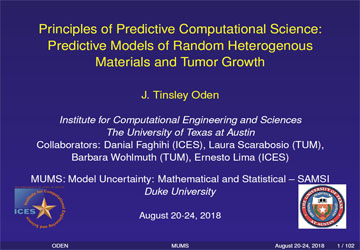Principles of Predictive Computational Science: Predictive Models of Random Heterogeneous Materials and Tumor Growth
August 20, 2018
Abstract
This presentation begins with a survey of the principles of predictive computational science: the discipline concerned with assessing the predictability of mathematical and computational models of events that occur in the physical universe in the presence of uncertainties. We then focus on key aspects of predictability: modeling error and how to estimate it, and model selection. The idea of optimal control of modeling error in which a sequence of models is generated so as control error relative to a high-fidelity ground truth model is discussed, as well as the related problem in which, given noisy data , we wish to select, calibrate, and validate a model’s ability to predict quantities of interest with a preset level of accuracy. As applications, we consider the analysis of random heterogeneous media and the construction and selection of mathematical models of tumor growth. We discuss OPAL, the Occam Plausibility Algorithm, as a framework for systematic model selection and validation. Examples of applications of these methodologies are given.
